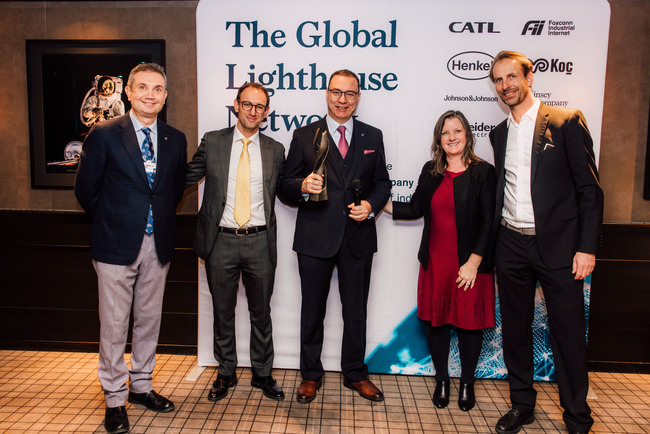VitrA Tiles Joins the Elite Global Lighthouse Network of the World Economic Forum
VitrA Tiles, a division of Eczacıbaşı Group, has been acclaimed for its innovative implementation of Fourth Industrial Revolution (4IR) technologies, becoming the first ceramics producer to be included in the World Economic Forum’s Global Lighthouse Network, exemplifying leadership in the adoption of 4IR advancements.
VitrA Tiles, the ceramic flagship of the Eczacıbaşı Group in Türkiye, has been welcomed into the Global Lighthouse Network (GLN), recognised as a Factory Lighthouse among 21 new inductees. This induction into the World Economic Forum’s initiative distinguishes VitrA as a frontrunner in innovative manufacturing practices.
At the Davos Summit awards ceremony held on January 15, 2024, Atalay Gümrah, CEO of Eczacıbaşı Group, and Hasan Pehlivan, CEO of VitrA Tiles, delivered speeches. They elaborated on the importance of tech-enhanced operations and expanding Fourth Industrial Revolution technologies in their production strategies.
This distinction is particularly significant, as VitrA Tiles is the first entity in the ceramics sector to receive recognition from the World Economic Forum for its application of 4IR technologies.
Turning Challenges into Opportunities for Innovation and Growth
Atalay Gümrah, the CEO of Eczacıbaşı Holding, shared his thoughts on this achievement, stating, “We are thrilled that our Bozüyük Production Facility has been selected as one of GLN’s Factory Lighthouses, in recognition of the leadership we have shown in deploying Fourth Industrial Revolution technologies. Facing disruptions in manufacturing from climate change, a volatile financial landscape, and geopolitical crises that have led to fluctuating energy prices, particularly in Türkiye, this recognition underscores how we looked at these challenges not as setbacks, but as catalysts for further innovation and growth, harnessing 4IR to enhance our operational competitiveness.”
The GLN is a network of manufacturing leaders who are pioneering the application of 4IR technologies to revolutionize their factories, supply chains, and business models, achieving notable financial and operational outcomes. The Factory Lighthouses serve as models for how manufacturing innovations can enhance performance and adaptability amidst changing market conditions.
Digital Innovation Spurs Remarkable Progress
VitrA Tiles’ Bozüyük site capitalised on its digital transformation strategy, focusing on intelligent process and production controls. This led to an impressive 19% increase in Overall Equipment Effectiveness, a reduction in scrap by 56%, a 14% cut in energy usage, and a 43% rise in recycled material usage within the last year.
Commenting on this progress, Hasan Pehlivan, CEO of VitrA Tiles, said, “While our solutions might be unique, the challenges we face are global, and we recognize the value of a global community in solving global challenges. The future of manufacturing is not about just one company, or one sector, or a single country, but about bringing the global community together to address major challenges. I believe the GLN has much to contribute to this journey, and I welcome this excellent latest initiative from the World Economic Forum.”
AI and Machine Learning Revolutionising Manufacturing Worldwide
In a world characterised by rapid technological changes, increasing geopolitical instability, and intensifying climate issues, members of the Global Lighthouse Network are adopting groundbreaking technologies to improve productivity and sustainability. By leveraging Artificial Intelligence (AI) and machine learning, these Lighthouse factories are leading a global manufacturing revolution. Notably, 85% of Lighthouse factories experienced less than a 10% revenue drop during the peak of the COVID-19 pandemic, showcasing a resilience that outperformed the majority of other manufacturers.
These Lighthouse factories are spearheading a substantial global impact in manufacturing. They are integrating innovative solutions across their networks, charting the course towards a sustainable future and initiating a new era of transformative, lasting change. This strategic emphasis on innovation is reshaping the manufacturing industry, highlighting the significant role of advanced technology in addressing contemporary global challenges.

